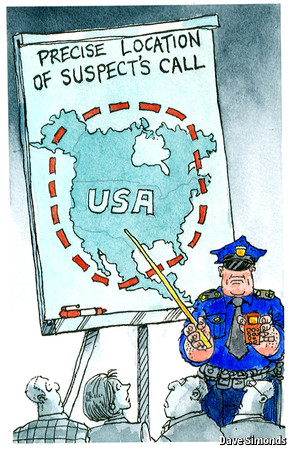But the high-tech evidence against her was bunk. Routinely collected tower data can place a mobile phone in a broad area, but it cannot “pinpoint” it. That would require a special three-tower “triangulation”, which cannot reveal past locations........
Mobile-phone-tower location data is widely used in court, says Steven Jansen of the Association of Prosecuting Attorneys in Washington, DC. Last year America’s courts and law-enforcement agencies served 37,839 subpoenas, court orders, and search warrants for location data just to one phone company, AT&T.........
Most police officers and lawyers have “no clue” how phone networks function, says Ryan Bialas, a North Dakota public defender. Cop shows like “CSI” give juries the idea that scientific evidence is almost infallible. But tower data is far less accurate than prosecutors sometimes claim.....
(The tower cited in the case) could have handled calls from as far as 20 miles (32km) away, according to a deposition prepared by Cherry Biometrics. Which tower a phone connects with depends on such factors as how thick the nearby foliage and walls are, the size of nearby cars and bodies of water, and how well the handset is working. None of this information is usually recorded.Thus, the fact that three towers are receiving data from a cell phone does not mean that those three towers are the closest to that cell phone, nor that the strength of the signal at each of those towers is directly proportional to its distance to the phone.
It seems to me that prosecutors' offices, public defenders' offices, and the courts need scientific and technological advisory committees. Those committees might provide advice on such matters as to what cell phone triangulation data actually means. Similarly, such a committee might help interpret the meaning of DNA analysis results, fingerprint analysis results, voice analysis, etc. Indeed, the Department of Justice might regularly ask the National Academies of Science and Engineering for reports on such matters.
In my county, which is a world center for DNA analysis, it has sometimes taken a year or more for the police to obtain a DNA analysis related to a criminal investigation. A scientific advisory panel could perhaps have suggested means by which such analysis could be made much faster, and thus more useful. My county also has many residents who are university scientists, National Institutes of Health (NIH) scientists, and National Institute of Standards and Technology (NIST) scientists. Not only is it richly endowed with scientific and technological expertise, but I think the scientific and technological community would be happy to provide expert advice without cost to the government.
Police officers, defendants in court cases, and juries can not be expected to understand scientific and technical evidence if it is not presented well by the lawyers (in advocating their cases) and without proper guidance from judges. The lawyers and judges thus need themselves to understand, and need access to experts for guidance.

No comments:
Post a Comment